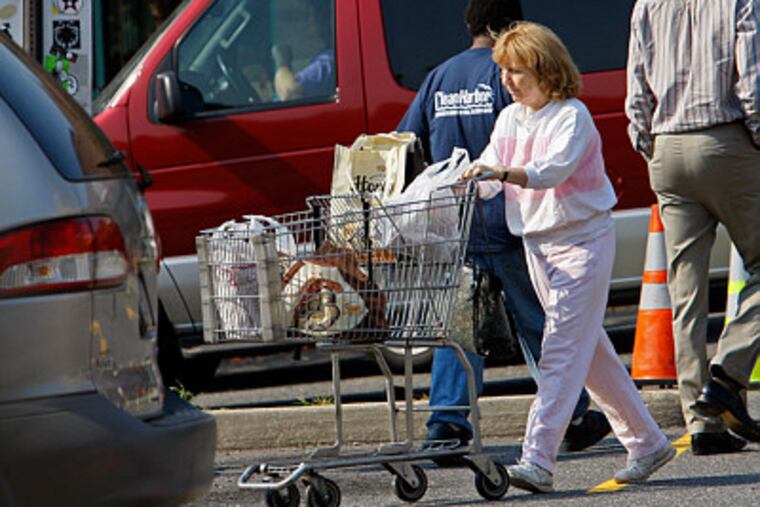Suspense surrounds $100M Center City supermarket project
It would be the second-largest Whole Foods Market in the region - just smaller than a suburban behemoth at Plymouth Meeting Mall. It would have an enormous underground parking garage. And, most strikingly, it would be a stone's throw from the Philadelphia Museum of Art.

It would be the second-largest Whole Foods Market in the region - just smaller than a suburban behemoth at Plymouth Meeting Mall. It would have an enormous underground parking garage. And, most strikingly, it would be a stone's throw from the Philadelphia Museum of Art.
But principals in the hoped-for $100 million project for downtown Philadelphia remained tight-lipped Thursday about where, exactly, the lavish new store would be built, even though what they had in mind was a whopper on par with the mammoth Whole Foods on Columbus Circle in Manhattan.
Is the Art Museum visible from any portion of the three-acre property that has been secured for the project? Center City-based developer Neal Rodin chuckled at the question before demurring. Others, too, declined to divulge.
Confidentiality provisions of Rodin's lease with Whole Foods meant no one could say. But Rodin said he planned to make the information public in the next 90 days, once designs for 250 apartments to be built in four or five stories above the market, and other elements including 15,000 additional square feet of retail, had been hashed out.
The project was announced a day earlier in a bare-bones news release by Austin, Texas-based Whole Foods and is targeted for completion in 2017. It is more than an early-stage concept with low odds of consummation, as has often been the case with ambitious mixed-use downtown projects in Philadelphia, Rodin said.
"This development will happen," said Rodin, chairman of International Financial Co. L.L.C., which he described as a very private company that prefers to stay out of the spotlight. "The nucleus of this development - that spurs it on, will make it happen - is the Whole Foods lease."
Rodin's company has secured ownership rights to the undisclosed parcel, he said.
And while, in Rodin's words, "nothing is done till it's done - that's the real world," he suggested that the project was far from a speculative enterprise being unveiled to the public by trial balloon. Plans are to finance it entirely with private money, he said.
"We don't do volume," Rodin said of his company, which is engaged in projects as far-flung as Paris and has hired an unidentified out-of-town architectural firm to draw up plans for the Whole Foods-anchored development. "We do quality. We do a few deals a year. And we build to keep."
Whole Foods created a buzz in Philadelphia on Wednesday when it disclosed that it had signed a lease with Rodin's company for the new store at an undisclosed location near its longstanding 20th and Callowhill Streets store, also near the Art Museum.
The only three-acre lots that reportedly fit the bill in the neighborhood - apart from fields owned by Fairmount Park - now have existing buildings, suggesting that development would be a teardown.
The Callowhill location is near a neighborhood of higher-income homes in Fairmount, within reach also of affluent Rittenhouse Square, and relatively close to ramps for the Vine Street Expressway. It also is next to the newly opened Barnes Foundation on the Parkway.
The planned flagship would replace the often-crowded 30,000-square-foot Callowhill store, which for years has served a burgeoning downtown otherwise criticized for its lack of supermarkets or even street-level grocers, as are found in many of Manhattan's well-heeled neighborhoods. The Callowhill lease reportedly expires about 2017.
The proposed new store, at 55,000 square feet, would be built entirely on one floor at street level, roughly the combined size of Whole Foods' Callowhill and South Street stores, said Ken Bleznak, the chain's exclusive real estate scout for the region.
It also would have significant parking, unlike the Callowhill store, whose small, open-air parking lot is a notorious obstacle course of motorists dodging shopping carts and pedestrians.
Bleznak, president of Bala Cynwyd-based Atlantic Real Estate Group, has helped locate many of the properties that Whole Foods has opened across the region in the last 12 years. He worked for several years, he said, on the 65,000-square-foot Whole Foods at Plymouth Meeting Mall.
Bleznak spoke with excitement about the chain's desire to plunk so large a supermarket in downtown Philadelphia, where limited high-rise housing and an abundance of the city's trademark rowhouses and lower-density homes have tended to make it difficult for retailers to figure out how to make their money back with a large store.
"For a Center City store," Bleznak said, "55,000 square feet is epic."
He added: "Everyone wants to build this thing."
Rodin said it was Whole Foods that decided how large the new store would be. Its Callowhill location, he added, has been "busting out at the seams."
Whole Foods declined to make anyone available for interviews Thursday.
"The new store will provide an enriched shopping experience and be on par with neighboring retailers, apartments and venues," Mid-Atlantic region president Scott Allshouse said in a news release the day before.
The supermarket would sit atop an underground parking garage with 170 spaces, or three cars for every 1,000 square feet of supermarket, Rodin said. That 3-1 ratio is close to suburban grocery-parking-lot capacity, he said.
Two escalators and three elevators would transport customers into the store, where they would find a restaurant and a large seating area for, say, sipping coffee, he said.
For Whole Foods, expanding deeper into cities is not unique, despite the chain's considerable presence in the suburbs. The grocer recently announced plans for a third store in Pittsburgh, at 40,000 square feet, Bleznak said.
The size of the planned Art Museum flagship, he said, makes a statement: "It's that next level of Whole Foods."